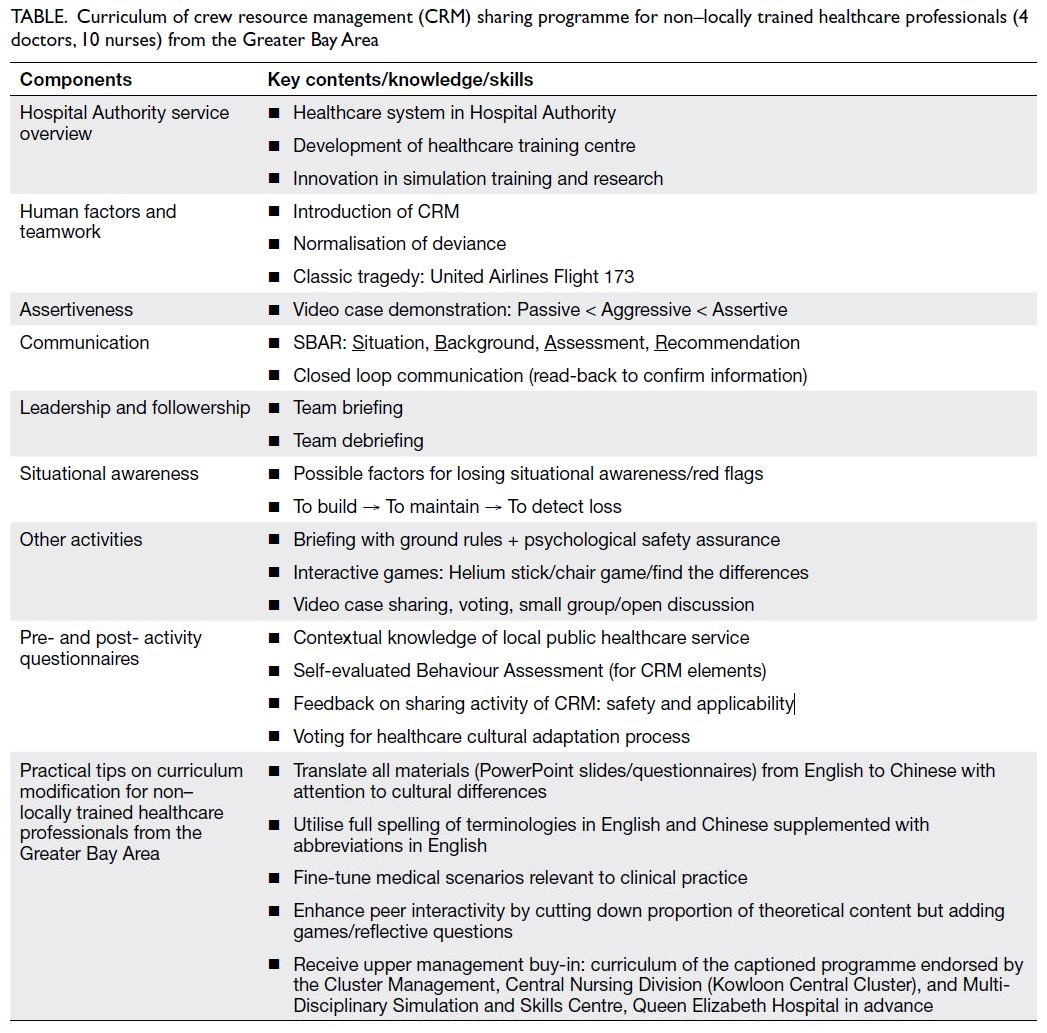Hong Kong Med J 2024 Feb;30(1):80–1 | Epub 1 Feb 2024
© Hong Kong Academy of Medicine. CC BY-NC-ND 4.0
LETTER TO THE EDITOR
Specialised crew resource management programme for non–locally trained healthcare professionals: expediting healthcare cultural adaptation
Eric HK So, MB, BS, FHKAM (Anaesthesiology),1,2; Victor KL Cheung, MSc (OP), RegPsychol (HKPS)1; Avis SH Leung, MSSc, RN1; SS So, MSc, BBA1; Jeff LK Hung, MSc, BSSc1; Terry ML Yau, MBA, SNM3; NH Chia, MB, BS, FRCSEd (Gen)1,4; George WY Ng, MB, BS, FCICM1,5
1 Multi-Disciplinary Simulation and Skills Centre, Queen Elizabeth Hospital, Hong Kong SAR, China
2 Department of Anaesthesiology and Operating Theatre Services, Queen Elizabeth Hospital, Hong Kong SAR, China
3 Central Nursing Division, Kowloon Central Cluster, Hospital Authority, Hong Kong SAR, China
4 Department of Surgery, Queen Elizabeth Hospital, Hong Kong SAR, China
5 Intensive Care Unit, Queen Elizabeth Hospital, Hong Kong SAR, China
Corresponding author: Dr Eric HK So (sohke@ha.org.hk)
To the Editor—Healthcare delivery is one of the most
complex sociotechnical processes with healthcare
practitioners working under adverse and stressful
conditions despite being adequately trained for
medical-technical proficiency. Human factors
contribute to 70% to 80% of medical incidents.1
The focus has shifted gradually from individual
competence to teamwork as a prerequisite to
improve patient safety.1 2
Teamwork skills training, crew resource
management (CRM), has become an essential
and integral part of a corporate-wide teamwork
training programme in the Hong Kong Hospital
Authority.1 Applying CRM can transform a team of
highly specialised experts into an expert team for
safe patient care, good working climate and team
member satisfaction.1
In April 2023, the Hospital Authority launched
its first Greater Bay Area (GBA) Healthcare Talents
Visiting Programme.1 In September 2023, a Multi-Disciplinary Simulation and Skills Centre at Queen
Elizabeth Hospital and the Central Nursing Division
co-organised a 4-hour classroom-based interactive
group sharing programme for 14 non–locally
trained professionals in the Kowloon Central Cluster
(Table).3 4 The elements covered in the Cluster’s CRM
training include assertiveness, communication,
leadership and followership (interpersonal skills),
and situational awareness (cognitive skills).

Table. Curriculum of crew resource management (CRM) sharing programme for non–locally trained healthcare professionals (4 doctors, 10 nurses) from the Greater Bay Area
This pilot programme, titled ‘Sharing Activity
for Non–Locally Trained Healthcare Professionals’
(深化醫療團隊協作), aimed to broaden participants’
awareness of the Hospital Authority organisational
structure and training centre development and share
elements of standard Kowloon Central Cluster CRM
training. The objective was improved better clinical
teamwork and adaptation among interdisciplinary
professionals from diverse training backgrounds.1 5
We conducted an evaluation before and after
this pilot programme. All items on pre- and post-questionnaires
used a 5-point Likert scale (1=Strongly
disagree, 2=Disagree, 3=Neutral, 4=Agree, 5=Strongly
agree). Our evaluation identified a remarkable
increase in understanding of the local healthcare
service (score range of the results of items in this
category=3.79-4.90; overall increase in knowledge
from pre-test to post-test in this category=23%) and
elements of CRM (score range of the results of items in this category=4.19-5; overall increase in knowledge
from pre-test to post-test in this category=20%).
All participants (n=14, 100%) found acquisition of
CRM could improve patient safety and 93% (n=13)
were confident that they could apply the principles
in clinical practice. From the perspective of personal
interests and clinical benefits, participants placed
a high value on all content but especially ‘Concept
of CRM’ (mean ± standard deviation=4.93 ± 0.27)
and ‘Simulation technology applied in training and
research’ (mean=5). A Self-Evaluated Behaviour
Assessment (SEBA-28) addressed the overall impact
of the programme on participants’ attitude towards
CRM-related behaviours (+10%), in particular
‘Situational awareness’ (+14%).5 When identifying
challenges in healthcare cultural adaptation, 93% of
participants (n=13) were optimistic that implementing
the concept of CRM would mitigate challenges
regarding communication, interdisciplinary team
cooperation, and cultural diversity.
The evaluation demonstrates the potential
and value of a CRM programme for non–locally
trained healthcare professionals. Various Hospital
Authority training centres could play an important
role to facilitate integration and interaction of team
members from diverse training backgrounds through
CRM training. Further study should be planned to fill
the knowledge and research gaps and build resilient
expert teams in the Hospital Authority.
Author contributions
All authors contributed to the concept or design of the letter,
acquisition of data, and analysis or interpretation of data. EHK
So and VKL Cheung drafted the letter. All authors critically
revised the letter for important intellectual content. All authors
had full access to the data, contributed to the study, approved
the final version for publication, and take responsibility for its
accuracy and integrity.
Conflicts of interest
All authors have disclosed no conflicts of interest.
Acknowledgement
The authors express their gratitude to the Hospital Authority
Head Office Medical Grade and the hospital management of
the Kowloon Central Cluster for their support and contribution
to the Crew Resource Management programme specialised for
non–locally trained healthcare professionals from the Greater
Bay Area.
Funding/support
This letter received no specific grant from any funding agency in the public, commercial, or not-for-profit sectors.
References
1. Chan CK, So EH, Ng GW, Ma TW, Chan KK, Ho LY. Participant evaluation of simulation training using crew resource management in a hospital setting in Hong Kong.
Hong Kong Med J 2016;22:131-7. Crossref
2. Hospital Authority. HASLink: strengthen exchange with
Greater Bay Area. November 2022. Available from: https://www3.ha.org.hk/ehaslink/issue122/en/feature-1.html. Accessed 5 Sep 2023.
3. So EH, Chia NH, Ng GW, et al. Multidisciplinary simulation
training for endotracheal intubation during COVID-19 in
one Hong Kong regional hospital: strengthening of existing
procedures and preparedness. BMJ Simul Technol Enhanc
Learn 2021;7:501-9. Crossref
4. Cheung VK, Chia NH, So SS, Ng GW, So EH. Expanding
scope of Kirkpatrick model from training effectiveness
review to evidence-informed prioritization management
for cricothyroidotomy simulation. Heliyon 2023;9:e18268. Crossref
5. Leung AS, So EH, Chan CN, et al. Embracing human
factors in assertiveness, communication, leadership
and followership, and situational awareness through
O&G specific CRM classroom training. Presented at:
KCC Convention; 26 November 2021; Hong Kong SAR,
China.

